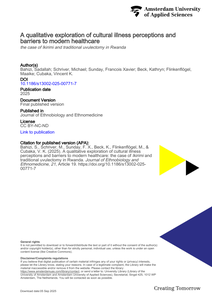BackgroundUnderstanding cultural perceptions of illness is crucial for effective healthcare delivery. This study examines the ethnomedical concept of ikirimi, a culturally recognized illness in Rwanda characterized by perceived uvula abnormalities, and its traditional management through uvulectomy. This study explores the cultural understanding of ikirimi, its perceived causes, symptoms, and treatments, as well as barriers to integrating modern healthcare.MethodsAn exploratory qualitative approach was employed, involving in-depth semi-structured interviews with eight participants: traditional healers, individuals who underwent traditional uvulectomy, and healthcare providers. A grounded theory approach which analyzes data in systematic manner to generate new theories was applied, with coding conducted in English after initial transcription and analysis in Ikinyarwanda to preserve Indigenous concepts.ResultsParticipants described ikirimi as an illness affecting the uvula (named as akamironko or akamirabugari or agashondabugari in Ikinyarwanda), characterized by swelling, elongation, and pus-like discoloration. Reported symptoms included fever, difficulty swallowing, coughing, and weakness, with children identified as the most affected group. Traditional healers diagnosed ikirimi through visual inspection of uvular morphology and movement and treated it by cutting the affected part of uvula and is known as guca Ikirimi ‘traditional uvulectomy’. Barriers to integrating modern healthcare included skepticism about biomedical care, judgmental attitudes from providers, and communication gaps. Despite the prevalence of ikirimi, its biomedical correlates remain unclear, though participants associated it with severe throat illnesses such as tonsillopharyngitis.ConclusionThe findings highlight ikirimi as a socially constructed illness with deep cultural roots, significant health implications, and persistent barriers to modern healthcare. Addressing these barriers requires culturally sensitive approaches that integrate Indigenous knowledge with biomedical practices. Future research should explore the biomedical correlates of ikirimi and foster collaboration between traditional and modern healthcare systems to improve patient outcomes.
DOCUMENT

Social entrepreneurs grow their enterprises while making do with what is at hand, which is the core principle of social bricolage. However, the extent to which social entrepreneurs enact social bricolage at different stages and how social bricolage is practiced in day-to-day operations in unexplored emerging economies have received little examination. Based on a thematic analysis of 19 interviews with social entrepreneurs in Kenya and Rwanda, we identified four types of social bricoleurs (i.e. social entrepreneurs who practice social bricolage): bootstrappers, hometown heroes, barrier breakers, and impact influencers. Each type reflects a social entrepreneurial stage, in which the dimensions of social bricolage are combined in different ways. Making do for social ends and social value creation are dominant for bootstrappers and hometown heroes. However, barrier breakers and impact influencers increasingly exercise refusal to be constrained, stakeholder participation, improvisation, and persuasion. Our findings contribute to a better understanding of social bricolage as a variable concept, thereby further refining social bricolage in social entrepreneurs’ daily operations across various stages and contexts of social enterprises.
MULTIFILE